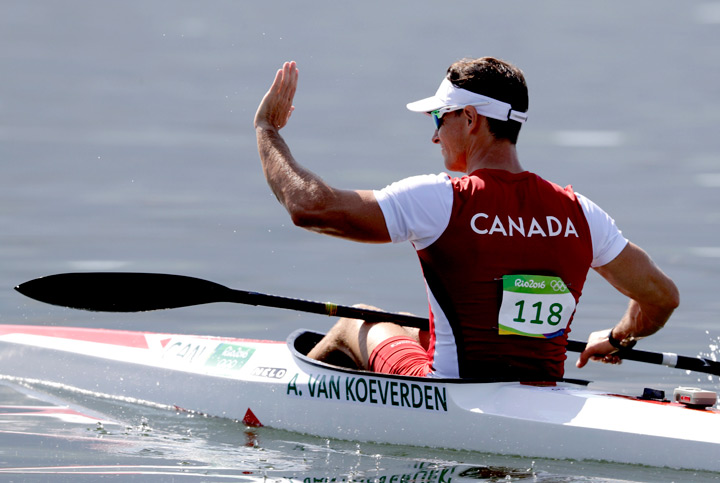It was a tough morning on the water in Rio for some of Canada’s most famous paddlers. Adam van Koeverden and Mark Oldershaw are out of medal contention in two of their respective Olympic events.

Van Koeverden, who competes in the men’s kayak single 1,000-metre event, came in a disappointing 6th place in his semi-final. Unfortunately for him, only the top four boats qualify for the medal round.
He had a bumpy start from the first stroke, he told CBC. “I couldn’t catch up. I tried three or four times.”
“Am I satisfied with my race? No. Am I satisfied with my performance? No,” he said. “I’m satisfied with my preparation and I’m so grateful for another opportunity to race for Canada.”
Van Koeverden wouldn’t say whether he is considering retiring from the sport following this Olympics, though he certainly hinted at the possibility.
“You get to write a storybook, but you don’t get to write your history,” said van Koeverden, sometimes pausing to collect his thoughts.
“For sure it’s hard. I don’t know what the next chapter of my life is going to involve. But I can be proud and I can be grateful, and those are the most important things.”
Van Koeverden holds Olympic silver and bronze medals in the 1,000-metre kayak sprint, and gold and silver in the 500-metre. He had originally planned on retiring in 2015, though changed his mind to go compete in Rio.
“I’ve never really made a conscious decision to race. It’s always been my obligation, my thing, my lot in life, my opportunity, my job,” he said. “And this year it was just my choice.”
Mark Oldershaw, from Burlington, Ont., finished fourth in his men’s canoe single 1,000-metre semifinal – not good enough to get him into the medal round. He won bronze in this event in London in 2012.
“You want to be in a final,” said the 33 year old. “That’s why you come to regattas, to be in that race. That was a good race, but the semifinal is not where you want to come up short. The whole year you think about the final.”
Oldershaw, a third generation Olympian who uncharacteristically faded over the final 100 metres, said it was a deeper field than he faced four years ago.
“It just made it that much tougher to crack the final,” he said. “I still feel like if I lined up in the final I’d have a shot at a medal. I think that’s how deep the field is. I just wish I could be part of it.”
Unlike van Koeverden, Oldershaw still has another chance to compete: Wednesday in the 200-metre.
Canadian pair Genevieve Orton and Kathleen Fraser also failed to qualify for the medal final in the women’s kayak double 500-metre. Andreanne Langlois finished in 14th place in the women’s kayak single 200-metre event.
Changing the sport
But the day was really about van Koeverden.
Portugal’s Frenando Pimenta, who finished second in their heat and will compete for a medal on Tuesday, walked over to him on the dock after the race and embraced the veteran Canadian before sharing a quiet word.
“He said, ‘You were my example,”‘ said van Koeverden. “It means maybe I changed the sport a little bit.”
Before van Koeverden started winning races with lightening quick starts — he finished on the podium at the worlds eight times, with two gold medals — paddlers didn’t force their way in front of the pack early, instead laying in wait for someone else to make the first move.
Canadian coach Scott Oldershaw, who represented Canada at the 1984 Olympics and is Mark’s dad, said the opposite is now the norm.
“He influenced the sport huge,” said Scott Oldershaw. “There are so many guys now doing what he did — just going out fast as they can and hanging on. It’s a different game.”
The senior Oldershaw also didn’t hold back when touching on what van Koeverden, an athlete he’s coached since 2002, has meant to Canada on and off the water.
“An inspiration to so many people,” said Oldershaw.
“He’s inspired people in a lot of different sports other than canoe-kayak. Not only the four medals, but his thoughts on life and his thoughts on competition.”
Van Koeverden seems like a man with no regrets. He knew it would be a challenge to make the final in Brazil, and he’s thankful he gave himself the opportunity to be in Rio and enjoy one last ride.
“Sports is about a hell of a lot more than winning kayak races for me,” he said. “Getting to watch our women kick serious ass, watching Andre De Grasse … I’ve never prouder to be Canadian. I know this is a big departure from who I was in 2004.
“Maybe the thing that I’m taking away from my entire career is that I’ve learned a hell of a lot.”
Canoe and kayak sprint events continue all week in Rio.
With files from Joshua Clipperton, The Canadian Press





Comments